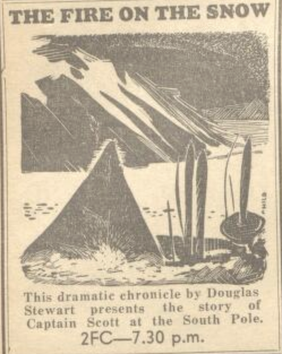Related Research Articles
Blue Hills, created and written by Gwen Meredith, is an Australian radio serial about the lives of families, set in a fictional typical Australian country town called Tanimbla. The title "Blue Hills" itself derives from the residence of Dr. Gordon, the town's doctor.

The Australian Capital Territory Legislative Assembly Building, also known as the South Building, is located on the southern side of Civic Square, London Circuit, Civic in the Australian Capital Territory. The public entrance to the Assembly is accessible from Civic Square, on the eastern side adjacent to the Canberra Theatre Centre.
2CA is an Australian commercial radio station on the AM band serving Canberra. It is jointly owned by the Capital Radio Network and Grant Broadcasters. The station broadcasts on AM Stereo 1053 kHz and on DAB.

Summer of the Seventeenth Doll is a 1959 Australian-British film directed by Leslie Norman and is based on the Ray Lawler play Summer of the Seventeenth Doll. In the United States the film was released under the title Season of Passion.

The Fire on the Snow is a 1941 Australian verse play by Douglas Stewart about the Terra Nova Expedition to Antarctica by Robert Falcon Scott. It premiered on ABC radio on 6 June 1941 to great acclaim and inspired a series of Australian verse dramas on ABC radio.
"A Time to Speak" is a 1965 Australian television film, which aired on ABC. It is a period drama set around 1900. It was written by Noel Robinson. This was the third production to appear in three weeks. It aired on 7 April 1965 in Sydney and Melbourne.
"The Sweet Sad Story of Elmo and Me" is a 1965 Australian television film which aired on ABC as part of Wednesday Theatre. It aired on 28 July 1965 in Melbourne and Sydney.
Phillip Grenville Mann was an Australian actor, playwright, stage director and manager, and writer.
The Man Who Shot the Albatross is a play by Ray Lawler about the Rum Rebellion, first performed in 1971. A 1972 television film featured the stage cast.
"The Tower" is a 1964 TV play broadcast by the Australian Broadcasting Corporation. It aired on 2 December 1964 as a stand-alone in Melbourne and on 28 April 1965 as part of Wednesday Theatre in Sydney. It aired on 6 January 1965 in Brisbane. It was based on a play by Hal Porter and directed by Christopher Muir in the ABC's studios in Melbourne.
George F. Kerr was an English writer best known for his work in TV. He worked for eight years in British TV as a writer and script editor.
Christopher Muir was an Australian director and producer, notable for his work in TV in the 1950s and 1960s. In the 1980s he was head of ABC Television drama.
James Workman was a Scottish-born actor and writer who mostly worked in Australia.
Six Directions was an art collective in Sydney, Australia, formed in 1953 by six post-war immigrants from Europe. They held group exhibitions at Bissietta's Gallery, at 70 Pitt Street, Sydney in 1957 and at the Riverside Gallery, Canberra, in 1958. All were members of the Contemporary Art Society of New South Wales, and were described as bringing new interest in texture to Australia.
James Thomas Gussey was a New Zealand-born trumpeter who had a successful career in Australia. He is best remembered as conductor of the ABC Dance Band, performing on ABC radio and television networks.
The Day Before Tomorrow is a 1956 Australian play by Ric Throssell. It debuted at the Canberra Repertory Company in 1956 with Throssell appearing in a lead role. The Canberra Times called it "absorbing". The Bulletin called it "a very good play". Leslie Rees wrote "This nightmarish vision of what might challenge humanity at any moment was projected with grim directness and without relieving humour or even bitter wit. The world of the 1950s, daily warned of the bomb, readily absorbed the lesson."
For Valour is a 1960 Australian stage play by Ric Throssell.
Pirates at the Barn is a 1948 Australian stage play for children. It made its debut in 1948 and was very popular, being performed at the Minerva Theatre in 1949. The cast for that production included Grant Taylor and John Meillion.
Chris Gardner was the pen name for Marjorie Gardner, an English-Australian writer of television, radio and theatre.
Julie Was is a 1959 Australian radio play by Peter Kenna. It was his first radio play and followed his debut as a writer with The Slaughter of St Teresa's Day.
References
- ↑ "Conviction And Unreality In Throssell Play". The Canberra Times . Vol. 33, no. 9, 626. Australian Capital Territory, Australia. 1 November 1958. p. 6. Retrieved 15 July 2023– via National Library of Australia.
- ↑ "Theatre Director To See Play". The Canberra Times . Vol. 33, no. 9, 623. Australian Capital Territory, Australia. 29 October 1958. p. 2. Retrieved 15 July 2023– via National Library of Australia.
- ↑ "Mr. Throssell's "Legend"". The Canberra Times . Vol. 33, no. 9, 632. Australian Capital Territory, Australia. 8 November 1958. p. 2. Retrieved 15 July 2023– via National Library of Australia.
- ↑ "Mr. Throssell's "Legend"". The Canberra Times . Vol. 33, no. 9, 634. Australian Capital Territory, Australia. 11 November 1958. p. 2. Retrieved 15 July 2023– via National Library of Australia.
- ↑ "Iron Curtain divides star-crossed lovers". ABC Weekly. 20 May 1959. p. 12.
- ↑ ""Legend" To Be Broadcast". The Canberra Times . Vol. 33, no. 9, 297. Australian Capital Territory, Australia. 23 May 1959. p. 2. Retrieved 15 July 2023– via National Library of Australia.
- ↑ Rees, Leslie (1987). Australian drama, 1970-1985 : a historical and critical survey. p. 376.